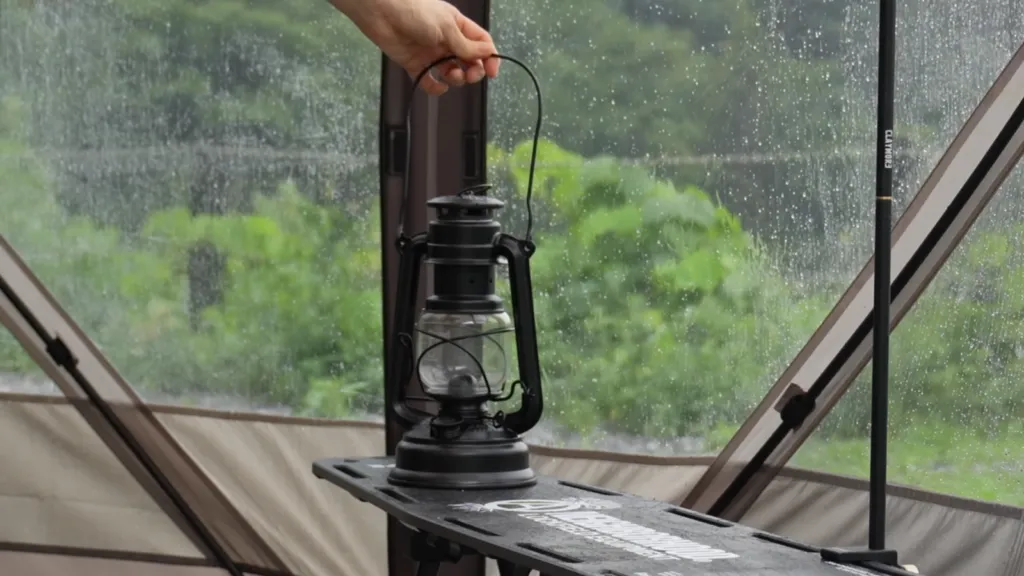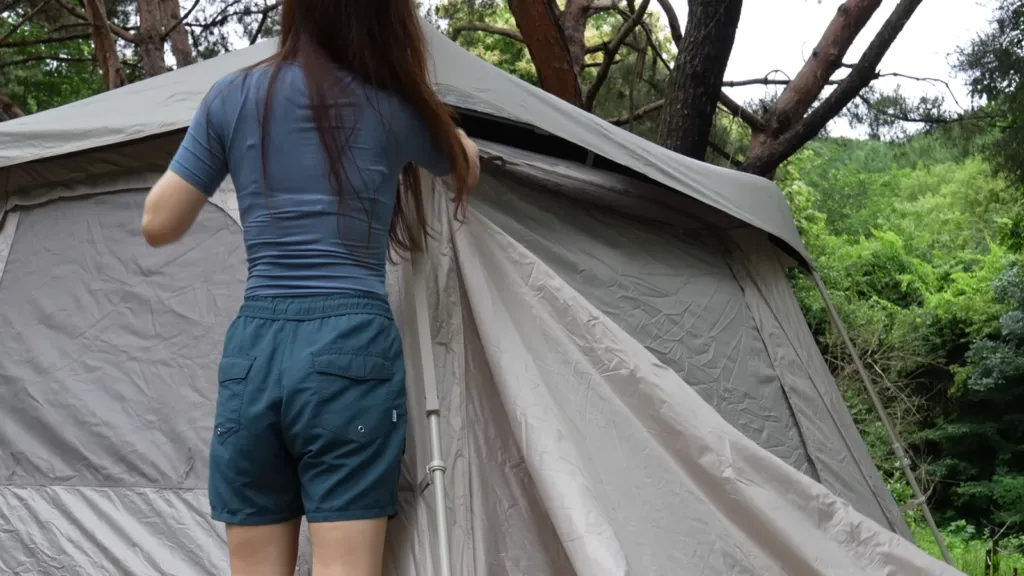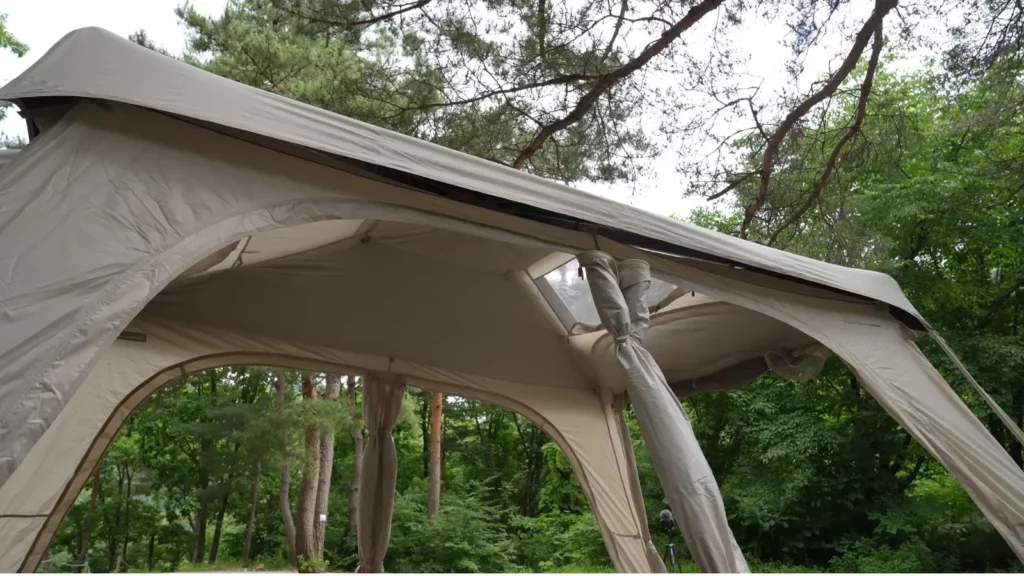
This article will help you understand what is the purpose of a cabin tent.
Among the various types of tents available, cabin tents stand out for their unique features and advantages. In this article, we delve into the world of cabin tents and explore their main purpose.
Table of Contents
What a Cabin Tent Is?

Now let’s discuss what a cabin tent really is. We have divided this in 2 parts for you, so that you can understand it easily.
Definition of a Cabin Tent
A cabin tent, as the name suggests, is designed to mimic a cabin’s structure. It is characterized by near-vertical walls, a high ceiling, and a spacious interior, often with room dividers.
The design of a cabin tent is distinct from typical dome or tunnel tents, providing a more homely and comfortable atmosphere.
Typical Uses of Cabin Tents
Cabin tents are highly versatile and these types of tents are the choice for various scenarios. They are ideal for family camping trips, offering a comfortable space for everyone to live and sleep.
You’ll also be able to find them at music festivals, where the additional space and comfort are appreciated, and they are even handy for backyard camping experiences!
What is The Purpose of a Cabin Tent

Now, after learning what a cabin tent really is, let’s start knowing the purpose of a cabin tent. This part will go through 4 topics that will help you understand it easily.
Offering Spacious Accommodation
One of the main purposes of a cabin tent is to provide ample room. Unlike some other tent types, cabin tents have high ceilings, allowing most people to stand up straight inside. They are also typically larger in floor space, often designed to accommodate multiple occupants comfortably.
Providing Home-Like Comfort
Cabin tents come with features that offer a touch of home, enhancing your camping experience. Many come with room dividers, allowing for separate sleeping or living spaces. Windows provide light and ventilation, and some even have porch areas to sit and enjoy the scenery.
Ensuring Stability and Weather Resistance
Despite their size, the purpose of a cabin tent are designed to withstand a variety of weather conditions. They are built with sturdy materials and a strong structure to resist wind, rain, and sometimes even snow, keeping you safe and dry in the great outdoors.
Facilitating Easy Setup
Ease of setup is another purpose of a cabin tent. Manufacturers often include features like color-coded poles and quick setup mechanisms, reducing the time and effort needed to get your campsite ready.
Comparing Cabin Tents with Other Types of Tents
I hope you have understood the purpose of a cabin tent. Now, let’s compare it with some different types of the tent.
Dome Tents
While dome tents might be simpler to set up and often lighter, they usually provide less space and height than cabin tents. They are better suited for backpacking trips or expeditions where weight and easy mobility are key.
Tunnel Tents
Tunnel tents offer a great deal of space and are quite stable, making them an excellent alternative to cabin tents. However, their setup can be more challenging, and they may lack the “home-like” features found in cabin tents.
Backpacking Tents
Backpacking tents are designed for lightness and compactness, prioritizing easy transport. They typically offer less space and comfort compared to cabin tents, making them more suitable for long hikes and minimalistic camping.
Choosing the Right Cabin Tent
After knowing the differences between a cabin tent and other types of tents, it’s time to learn how to choose the right cabin tent.
Consider Your Camping Needs
When choosing a cabin tent, consider the number of people using it, the expected weather conditions, and your personal preferences for comfort and space.
Features to Look For
Key features to look for include the tent’s size, the quality of its materials, how easy it is to set up, and additional features like room dividers or included awnings.
Recommended Cabin Tents
While specific recommendations would require a deeper review, consider popular and highly-rated options such as the Coleman WeatherMaster, the Core 9-Person Instant Cabin Tent, and the Ozark Trail 10-Person Dark Rest Instant Cabin Tent.
Pros and Cons of Cabin Tents
Like any camping gear, cabin tents come with their own set of advantages and disadvantages. It’s important to consider these pros and cons to ensure that a cabin tent suits your specific needs and circumstances.
Pros
1. Spacious Interior: Cabin tents offer ample space, not only in terms of floor area but also in headroom. This allows for more comfort and freedom of movement inside the tent.
2. Home-like Features: Many cabin tents come with room dividers, windows, and even porch areas, offering a more homely and comfortable camping experience.
3. Weather Resistance: Despite their size, cabin tents are typically designed to withstand various weather conditions. High-quality ones should keep you dry in the rain and stable in the wind.
4. Easy Setup: Many cabin tents are designed for easy setup, with features like color-coded poles and quick setup mechanisms. This can be a significant advantage, especially for less experienced campers.
Cons
1. Weight and Bulk: Cabin tents tend to be heavier and bulkier than other types of tents, which can be a disadvantage if you need to carry your tent long distances.
2. Setup Difficulty: While many cabin tents are designed for easy setup, they can still be more challenging to erect than smaller, simpler tent designs, particularly in windy conditions.
3. Not Ideal for Rough Conditions: While cabin tents can handle a variety of weather, they might not be the best choice for extreme conditions or very uneven terrain. Their larger profile can make them less stable in high winds compared to lower-profile tents.
4. Cost: Due to their size and the materials used, cabin tents can be more expensive than other types of tents. However, for many campers, the added comfort and space are well worth the investment.
By weighing these pros and cons, you can make a more informed decision about whether a cabin tent is the right choice for your next camping trip.
Alternatives to Cabin Tents
While cabin tents are excellent for their comfort and space, there are other types of tents you might consider based on your specific camping needs.
- 1. Dome Tents: Dome tents are known for their durability and wind resistance. They’re typically lighter and easier to set up than cabin tents, making them a favorite among backpackers.
- 2. Tunnel Tents: Tunnel tents provide a good balance between weight and space. They’re easy to set up, sturdy, and offer ample room for sleepers and gear.
- 3. Backpacking Tents: These tents are designed for lightweight and compact travel. While they don’t offer as much space as cabin tents, they’re ideal for long hikes and solo or duo camping trips.
- 4. Rooftop Tents: Rooftop tents attach to the roof rack of your vehicle. They offer off-the-ground sleeping, making them great for camping in uneven or rocky terrain.
- 5. Pop-up Tents: Pop-up tents are designed for quick and easy setup. They’re ideal for festivals or short camping trips where convenience is key.
10 Benefits of Cabin Tents
- 1. Spacious: Cabin tents offer plenty of room for multiple sleepers and gear.
- 2. High Ceilings: The tall design allows campers to stand and move around comfortably.
- 3. Room Dividers: Some cabin tents include room dividers for added privacy.
- 4. Stability: Cabin tents are typically built for stability in various weather conditions.
- 5. Easy to Setup: Many models have features that make setup relatively easy.
- 6. Windows and Doors: Cabin tents often include multiple windows and doors for ventilation and easy access.
- 7. Home-like Features: Amenities like porches or awnings add to the home-like feel.
- 8. Great for Families: The size and features of cabin tents make them ideal for family camping trips.
- 9. Long-term Camping: Their durability and comfort make them suitable for extended camping trips.
- 10. Variety: There’s a wide range of cabin tents available, ensuring there’s an option to fit every camper’s needs.
Problems with Cabin Tents
While cabin tents come with many advantages, they also have their fair share of drawbacks.
- 1. Weight: Cabin tents are generally heavier than other types of tents, making them less ideal for backpacking.
- 2. Wind Resistance: The high profile of cabin tents makes them more susceptible to wind.
- 3. Setup: Despite features for easier setup, assembling a cabin tent can still be a challenge, especially for beginners.
- 4. Price: Cabin tents can be more expensive due to their size and the materials used.
- 5. Portability: Their bulkier size makes them less convenient to transport compared to smaller tents.
- 6. Overkill for Solo Campers: The space and features of a cabin tent might be excessive for a solo camper.
Remember, the best tent for you depends on your specific needs and circumstances. By considering these pros, cons, and alternatives, you can find the perfect tent for your next outdoor adventure.
Conclusion
In conclusion, the purpose of a cabin tent extends beyond mere shelter. It offers spacious accommodation, home-like comfort, stability, and ease of setup. Whether you’re planning a family camping trip or setting up a backyard campout, a cabin tent could be the perfect choice for you.
Choosing the right cabin tent involves a careful evaluation of your camping needs and personal preferences. But once you find the right one, you’re all set for a fantastic outdoor adventure. Happy camping!
What To Do Next
Now that you’ve explored the purpose, benefits, and drawbacks of cabin tents, and even examined a few alternatives, you’re ready for the next step.
Armed with this newfound knowledge, you can make an informed decision on whether a cabin tent is the right choice for your next camping adventure. It’s essential to consider your unique camping needs and preferences. Maybe you’re all about the space and comfort of a cabin tent, or perhaps the lightweight convenience of a backpacking tent is more your speed. Whatever your choice, the most important thing is that you find a tent that will enhance your camping experience, not hinder it.
If you’re leaning towards a cabin tent, it’s time to find the perfect one for you. Don’t be overwhelmed by the variety of options out there. We’ve done the heavy lifting for you and compiled a list of the best cabin tents available in the market.
Take the plunge and visit our page on the Best Cabin Tents. Here you’ll find a detailed review of top-rated cabin tents, each with their unique features and benefits. We’ve also included a handy buyer’s guide to assist you further in your decision-making process.
Remember, the wilderness is waiting, and your perfect cabin tent is just a click away. Happy camping!
Frequently Asked Questions
What is the main purpose of a cabin tent?
The main purpose of a cabin tent is to provide a comfortable and spacious shelter for campers. These tents are typically larger than other types of tents, making them perfect for families or groups. They often feature room dividers, multiple doors, and windows, which mimic the structure and comfort of a home. This makes them great for extended camping trips where comfort is key.
How does the design of a cabin tent benefit campers?
The design of a cabin tent offers several benefits to campers. The vertical walls and high ceilings provide more usable space and allow for standing room, which is not always possible in other types of tents. The structure also allows for a better organization with the possibility of separate ‘rooms’. Furthermore, many cabin tents feature a mesh roof, offering an option for stargazing when the weather permits.
Are cabin tents suitable for all weather conditions?
While cabin tents are designed to withstand various weather conditions, they are not invincible. They perform well in mild to moderate weather conditions but might not be the best option for heavy snowfall or extremely windy conditions due to their high profile. It’s always important to check the tent’s weatherproof rating and ensure it fits with your camping conditions.
What are some popular features to look for in a cabin tent?
Some popular features to look for in a cabin tent include room dividers for privacy, an e-port for electrical cord access, durable and waterproof material, mesh windows for ventilation, and a sturdy frame for stability. Some higher-end models may also include features like an awning or screen porch.
How does a cabin tent compare to other types of tents?
Compared to other types of tents, cabin tents are generally larger and more comfortable. They offer more headroom and living space, making them ideal for longer camping trips or family outings. However, this added comfort often comes with increased weight and bulk, making them less portable than other tent styles.
